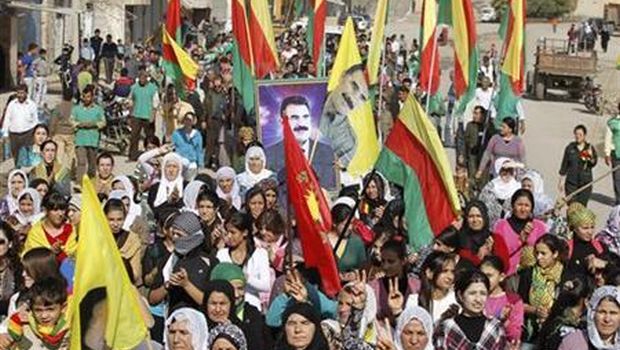
Syrian Kurd demonstrators hold flags and portraits of jailed Kurdistan Workers Party (PKK) leader Abdullah Öcalan during a protest in Hasakah, Syria on November 1, 2012. (Reuters/Thaier Al-Sudani)
Beirut, Asharq Al-Awsat—Syrian Kurdish leaders have become increasingly split over whether to allow Bashar Al-Assad’s government to allow voting in Syria’s forthcoming presidential election in areas under their control in northern Syria, Asharq Al-Awsat has learned.
The Kurdish Supreme Committee, a Kurdish umbrella group that has recently declared self-rule in the north of Syria, is yet to decide on the issue, although the polls—scheduled for June 3—are now less than a month away.
A spokesman for the committee, Juan Mohamed, told Asharq Al-Awsat: “The issue of holding presidential elections in the three Kurdish areas, Djazirah [northeast of Syria], Ayn Al-Arab and Afrin [north of Aleppo] has yet to be resolved.”
The election, derided as a sham by many international observers, has also been criticized by the rebel groups battling to bring down the government of Syrian President Bashar Al-Assad, with some describing it as a “farce.”
Apart from sporadic clashes with Islamist rebels, Kurdish militias have kept away from any direct involvement in the Syrian conflict, limiting their presence to the areas along the Turkish and Iraqi borders.
Kurdish militants have clustered into the People’s Protection Units (YPG), regarded as the Supreme Committee’s military arm, to maintain security in the areas they control.
Speaking exclusively to Asharq Al-Awsat, YPG spokesman Retwar Khalil said that Kurdish fighters will act in accordance with the Committee’s decision.
“Whether positive or negative, the nature of the decision does not concern the YPG, which is only concerned with implementing the Supreme Committee’s decisions,” he said.
Syrian Kurdish leaders face a dilemma regarding the upcoming presidential poll, having so far done their best to avoid taking sides in the conflict which has raged since 2011. Many fear that allowing balloting to take place in areas under their control means acknowledging the legitimacy of the Syrian government, and possibly damaging their own legitimacy in the eyes of their followers and angering Syrian rebel groups.
Conflicted reports about the Kurds’ position have been circulating. A senior YPG member Mahmud Barkhdan was quoted by pro-Kurdish Welati news network as saying: “No presidential elections will be held in Western Kurdistan because the Syrian regime has not offered anything to the Kurdish people.”
Meanwhile, there have been calls among Syria’s Christians for a boycott of the presidential elections, in protest against what they described as “discrimination” against Christians, according to some press reports.
According to the third article in Syria’s constitution, the President of the Republic must be a Muslim, while Islamic jurisprudence is the “main source” of legislation.
Speaking to Asharq Al-Awsat on the condition of anonymity, a source close to the leaders of the Christian community in Syria said: “There is a general trend among the Christians of Syria to boycott the elections, not because of their opposition to the government but rather in protest against discrimination being practiced against them.”
Speaking exclusively to Asharq Al-Awsat, a senior Christian Syrian opposition figure, Jamil Diyarbakirli, said: “The Syrian regime has always treated Christians as second-class citizens and used them in its propaganda to polish its image in front of the West.”
Diyarbakirli called Christians not only to boycott the vote but to “reject it entirely.”
Christians make up 10 percent of Syria’s total population of 23 million. The three-year conflict in Syria has seen large numbers of Christians fleeing the country as fears of sectarian violence have soared.
